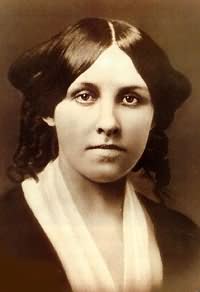Louisa May Alcott
Louisa May Alcott (November 29, 1832 – March 6, 1888) was an American novelist, short story writer, and poet best known for her novel Little Women and its sequels Little Men and Jo's Boys. Born in Germantown, Pennsylvania, Alcott was educated by her father, Bronson Alcott, and received further education from Ralph Waldo Emerson, Nathaniel Hawthorne, and Henry David Thoreau, who were family friends. The Alcott family suffered from financial difficulties, and Louisa worked to support her family through various occupations, including teaching, sewing, and serving as a Civil War nurse.
Early Life[edit | edit source]
Louisa May Alcott was born on November 29, 1832, to Abigail May and Amos Bronson Alcott in Germantown, which is now part of Philadelphia, Pennsylvania. She was the second of four daughters. The Alcott family moved to Boston in 1834, where Bronson Alcott pursued his career as an educator and philosopher, establishing the Temple School. The family's involvement in the transcendentalism movement deeply influenced Alcott's beliefs and writings.
Career[edit | edit source]
Alcott's early literary career began with the publication of her first book, Flower Fables (1854), a collection of tales originally written for Ellen Emerson, daughter of Ralph Waldo Emerson. However, it was the publication of Little Women in 1868 that established Alcott's reputation as a major writer. The novel, based on her own experiences growing up with her three sisters, was an immediate success and has never been out of print.
Following the success of Little Women, Alcott wrote several sequels, including Little Men (1871) and Jo's Boys (1886), and numerous other novels and short stories, often under pseudonyms. Despite her fame, Alcott continued to advocate for women's rights, abolition, and temperance.
Personal Life[edit | edit source]
Alcott never married. She suffered from chronic health issues, believed to have been exacerbated by her service as a Civil War nurse. Her experiences during the war deeply affected her and influenced her writing. Alcott was an advocate for women's suffrage and was the first woman to register to vote in Concord, Massachusetts.
Death and Legacy[edit | edit source]
Louisa May Alcott died of a stroke on March 6, 1888, in Boston, at the age of 55. She is buried in Sleepy Hollow Cemetery in Concord, near her family and fellow transcendentalists. Alcott's legacy endures through her literature, which continues to be read and appreciated for its portrayal of the complexities of family life, its strong, independent female characters, and its themes of personal and social responsibility.
Search WikiMD
Ad.Tired of being Overweight? Try W8MD's NYC physician weight loss.
Semaglutide (Ozempic / Wegovy and Tirzepatide (Mounjaro / Zepbound) available. Call 718 946 5500.
Advertise on WikiMD
|
WikiMD's Wellness Encyclopedia |
| Let Food Be Thy Medicine Medicine Thy Food - Hippocrates |
Translate this page: - East Asian
中文,
日本,
한국어,
South Asian
हिन्दी,
தமிழ்,
తెలుగు,
Urdu,
ಕನ್ನಡ,
Southeast Asian
Indonesian,
Vietnamese,
Thai,
မြန်မာဘာသာ,
বাংলা
European
español,
Deutsch,
français,
Greek,
português do Brasil,
polski,
română,
русский,
Nederlands,
norsk,
svenska,
suomi,
Italian
Middle Eastern & African
عربى,
Turkish,
Persian,
Hebrew,
Afrikaans,
isiZulu,
Kiswahili,
Other
Bulgarian,
Hungarian,
Czech,
Swedish,
മലയാളം,
मराठी,
ਪੰਜਾਬੀ,
ગુજરાતી,
Portuguese,
Ukrainian
Medical Disclaimer: WikiMD is not a substitute for professional medical advice. The information on WikiMD is provided as an information resource only, may be incorrect, outdated or misleading, and is not to be used or relied on for any diagnostic or treatment purposes. Please consult your health care provider before making any healthcare decisions or for guidance about a specific medical condition. WikiMD expressly disclaims responsibility, and shall have no liability, for any damages, loss, injury, or liability whatsoever suffered as a result of your reliance on the information contained in this site. By visiting this site you agree to the foregoing terms and conditions, which may from time to time be changed or supplemented by WikiMD. If you do not agree to the foregoing terms and conditions, you should not enter or use this site. See full disclaimer.
Credits:Most images are courtesy of Wikimedia commons, and templates, categories Wikipedia, licensed under CC BY SA or similar.
Contributors: Prab R. Tumpati, MD





